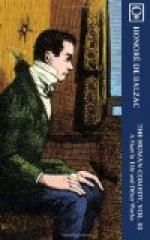“Monsieur le comte has just taken it.”
“Monsieur le comte!” cried Moreau. “Whom do you mean?”
“Why, the Comte de Serizy, our master,” she replied. “He is probably at the chateau by this time,” she added, anxious to be rid of the steward, who, unable to understand the meaning of her words, turned back towards the chateau.
But he presently turned again and came back to the lodge, intending to question the woman more closely; for he began to see something serious in this secret arrival, and the apparently strange method of his master’s return. But the wife of the gamekeeper, alarmed to find herself caught in a vise between the count and his steward, had locked herself into the house, resolved not to open to any but her husband. Moreau, more and more uneasy, ran rapidly, in spite of his boots and spurs, to the chateau, where he was told that the count was dressing.
“Seven persons invited to dinner!” cried Rosalie as soon as she saw him.
Moreau then went through the offices to his own house. On his way he met the poultry-girl, who was having an altercation with a handsome young man.
“Monsieur le comte particularly told me a colonel, an aide-de-camp of Mina,” insisted the girl.
“I am not a colonel,” replied Georges.
“But isn’t your name Georges?”
“What’s all this?” said the steward, intervening.
“Monsieur, my name is Georges Marest; I am the son of a rich wholesale ironmonger in the rue Saint-Martin; I come on business to Monsieur le Comte de Serizy from Maitre Crottat, a notary, whose second clerk I am.”
“And I,” said the girl, “am telling him that monseigneur said to me: ’There’ll come a colonel named Czerni-Georges, aide-de-camp to Mina; he’ll come by Pierrotin’s coach; if he asks for me show him into the waiting-room.’”
“Evidently,” said the clerk, “the count is a traveller who came down with us in Pierrotin’s coucou; if it hadn’t been for the politeness of a young man he’d have come as a rabbit.”
“A rabbit! in Pierrotin’s coucou!” exclaimed Moreau and the poultry-girl together.
“I am sure of it, from what this girl is now saying,” said Georges.
“How so?” asked the steward.
“Ah! that’s the point,” cried the clerk. “To hoax the travellers and have a bit of fun I told them a lot of stuff about Egypt and Greece and Spain. As I happened to be wearing spurs I have myself out for a colonel of cavalry: pure nonsense!”
“Tell me,” said Moreau, “what did this traveller you take to be Monsieur le comte look like?”
“Face like a brick,” said Georges, “hair snow-white, and black eyebrows.”
“That is he!”
“Then I’m lost!” exclaimed Georges.
“Why?”
“Oh, I chaffed him about his decorations.”
“Pooh! he’s a good fellow; you probably amused him. Come at once to the chateau. I’ll go in and see his Excellency. Where did you say he left the coach?”




